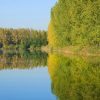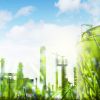Studying bioeconomics
Bioeconomy courses are among the most sought-after because they point the way to a sustainable economic system.

Bioeconomy at the Technical University of Munich
At the Straubing Campus for Biotechnology and Sustainability, a new research centre at the TU Munich, everything revolves around renewable resources, biotechnology and the bioeconomy. The bachelor's degree course in bioeconomics interlinks the natural sciences with economics and combines content from chemistry, engineering and life sciences with micro- and macroeconomics. Students learn to think and work in circular processes. The interdisciplinary master's degree course in renewable resources consolidates and expands this.
Biological resources at the Rhine-Waal University of Applied Sciences
The English-language master's degree course at Kleve teaches an understanding of biological resources, their value and their importance in a bio-based economy. This also includes identifying new potential applications of biological resources. The interdisciplinary course of study combines the natural-science perspective with an engineering and bioeconomics approach. Graduates offer core competencies in the development of bio-based products, from bioenergy to packaging to new food products.
Master's degree in bioeconomy at the University of Hohenheim
This English-language master's degree course takes an international perspective on the bioeconomy. The focus is on bio-based value chains and systems. Students deal with ecological, social and economic issues at both the micro and the macro level – always with a view to the political framework and its influence on innovative developments in the bio-based economy.
Technology of renewable resources at the Hanover University of Applied Sciences and Arts
In this bachelor's degree course, the fundamentals of process engineering are supplemented by key natural-science and economic content relevant to the meaningful use of renewable resources. The entire process is covered from plant production to harvesting technology, processing and analytics, as well as the manufacture of finished products. Graduates are just as familiar with botany and plant ingredients as with microbiological and biotechnological processes and the economic evaluation of processes.
You would like to receive regular information about Germany? Subscribe here:


